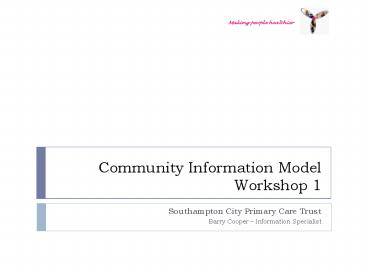Community Information Model Workshop 1 - PowerPoint PPT Presentation
1 / 20
Title:
Community Information Model Workshop 1
Description:
Input screens can be tailored to individual services ... Lilie System (GU C&SH) Business Objects Universes. Performance Management system ... – PowerPoint PPT presentation
Number of Views:30
Avg rating:3.0/5.0
Title: Community Information Model Workshop 1
1
Community Information ModelWorkshop 1
- Southampton City Primary Care Trust
- Barry Cooper Information Specialist
2
Community Information Model
- Systems currently in use for community services
- Functionality Benefits
- Information Gaps
- Stakeholder engagement
- Future plans
3
Background to Southampton City PCT
- One of the first PCTs formed (over 8 years ago)
- 82m turnover
- 2 main commissioners
- 2,000 staff (including 30 medical consultants)
- Dedicated information team (4 wte)
- One of the first PCTs to split Provider/Commission
ing Ledger - Co-terminus with City Council boundaries
(potential to further develop working
relationships across services systems) - Large acute teaching hospital shared PAS PMI
across acute trust, SCPCT and South West
Hampshire (NF ETVS). - 20 services including
4
Services provided by SCPCT
- District Nursing
- Health Visitors
- Podiatry
- Physiotherapy
- Speech Language Therapy
- Specialist Nursing (Diabetes, Stoma Care, HIV
etc) - Community Matrons
- Walk-in-centres and Out-of-hours
- Paediatric Occupational Therapy and Physiotherapy
- School Nurses
- Community Neurological Rehab teams
- GU Medicine and Contraception Sexual Health
services - Community Beds (Rehab)
- CAMHS
5
1. Systems currently in use
- Our systems range from paper based activity
recording to electronic patient based systems. - There are a wide range of electronic systems in
use across our services, the majority of which
are built for a specific service e.g. Adastra
Lilie. - Whilst there are benefits to having these
specific systems it does mean they cannot be
transferred to other services.
6
1. Systems currently in use
7
2. Current System functionality and benefits
- CaRs Community Activity Recording System
8
2. Current System Functionality
9
2. Current System Functionality
10
2. System Functionality and benefits
- CICS Community Information Computer system
11
3. Information Gaps
- Most services collecting aggregate data on
activity - Currently no common set of definitions
- Services could potentially interpret data in
their own way (i.e. what is a contact) - Growing need for detailed information
- Outcome measures
- 18 week waiting times
- Patient satisfaction
- Benchmarking
- Difficult to work out demand and capacity
- Choose book not able to cope with directly
bookable service
12
4. Stakeholder Engagement
- Mixed responses from services
- Justification for Clinical staff to be
undertaking what is deemed as data input - Perception that data goes into a black hole
- Realistic / Unrealistic expectations of services
- Change management
- Investment needed from PCT and Commissioners
- Small value contract compared to acute sector
- Commissioners keen to get outcome based measures
as part of World Class Commissioning
13
5. Future Plans - Key Information Strands
14
5. Future Plans Stepped Change
The Vision
15
5. Future Plans Stepped Change
15 of services
Where are we now?
25 of services
60 of services
16
5. Future Plans Successes so far
- Where are we now reporting to commissioners
17
5. Future Plans Dependencies
18
5. Future Plans
- Which services have requirement to replace
current system? - Which services need to move to patient based
recording? - Which services need to record waiting times?
- Which services could potentially use new PAS?
- Which services would be in scope of CFH
community solution?
- What solutions are available?
- What timescales are we working to and what can
be achieved in that period?
- What are the requirements of services within
scope for CFH solution and what can be learnt
from Interim deployments? - What are the national requirements that a CFH
solution must meet?
19
5. Future Plans
- What does the ideal state look like?
20
Any questions?
- Contact details
- E barry.cooper_at_scpct.nhs.uk
- T 023 8029 6026































